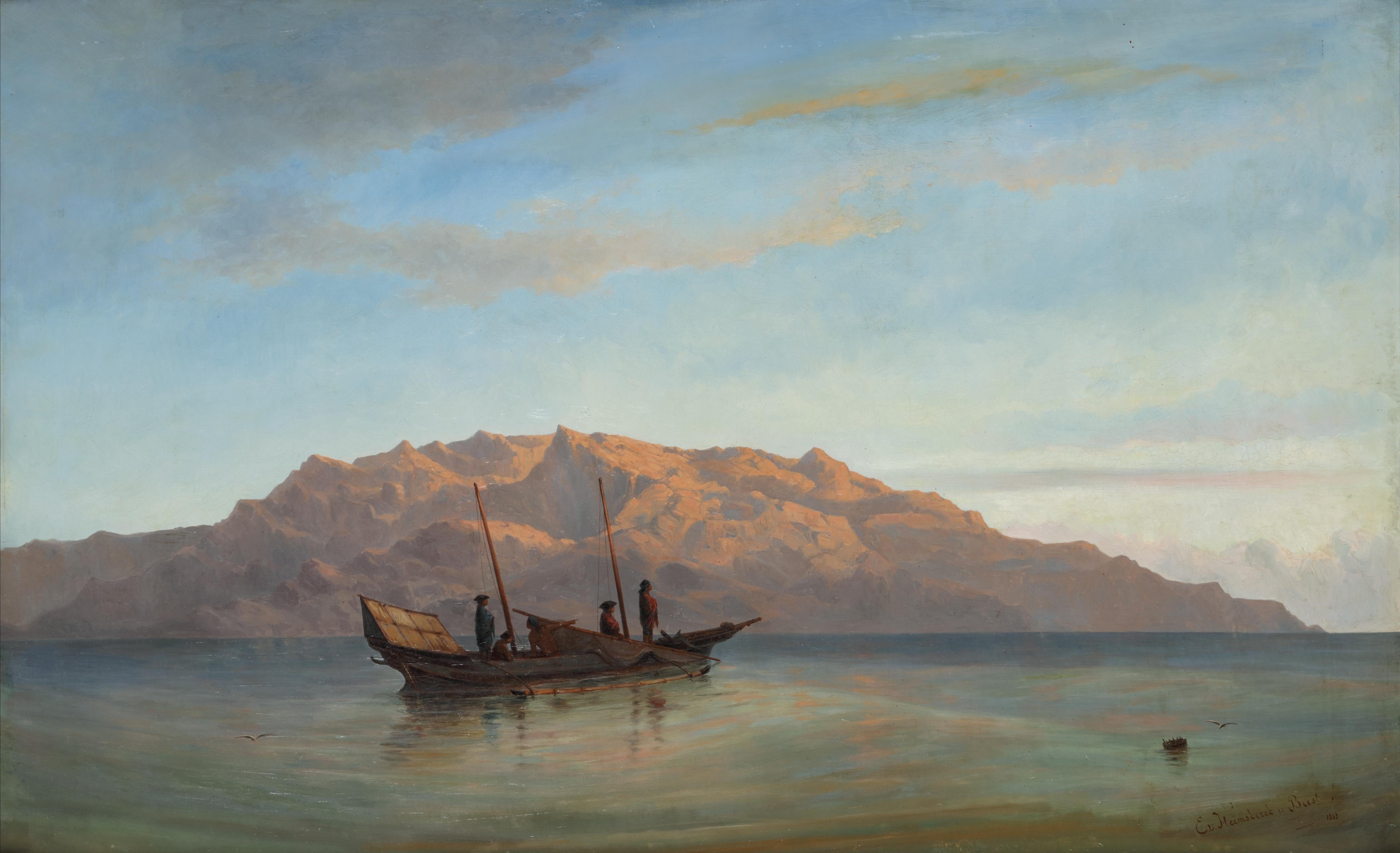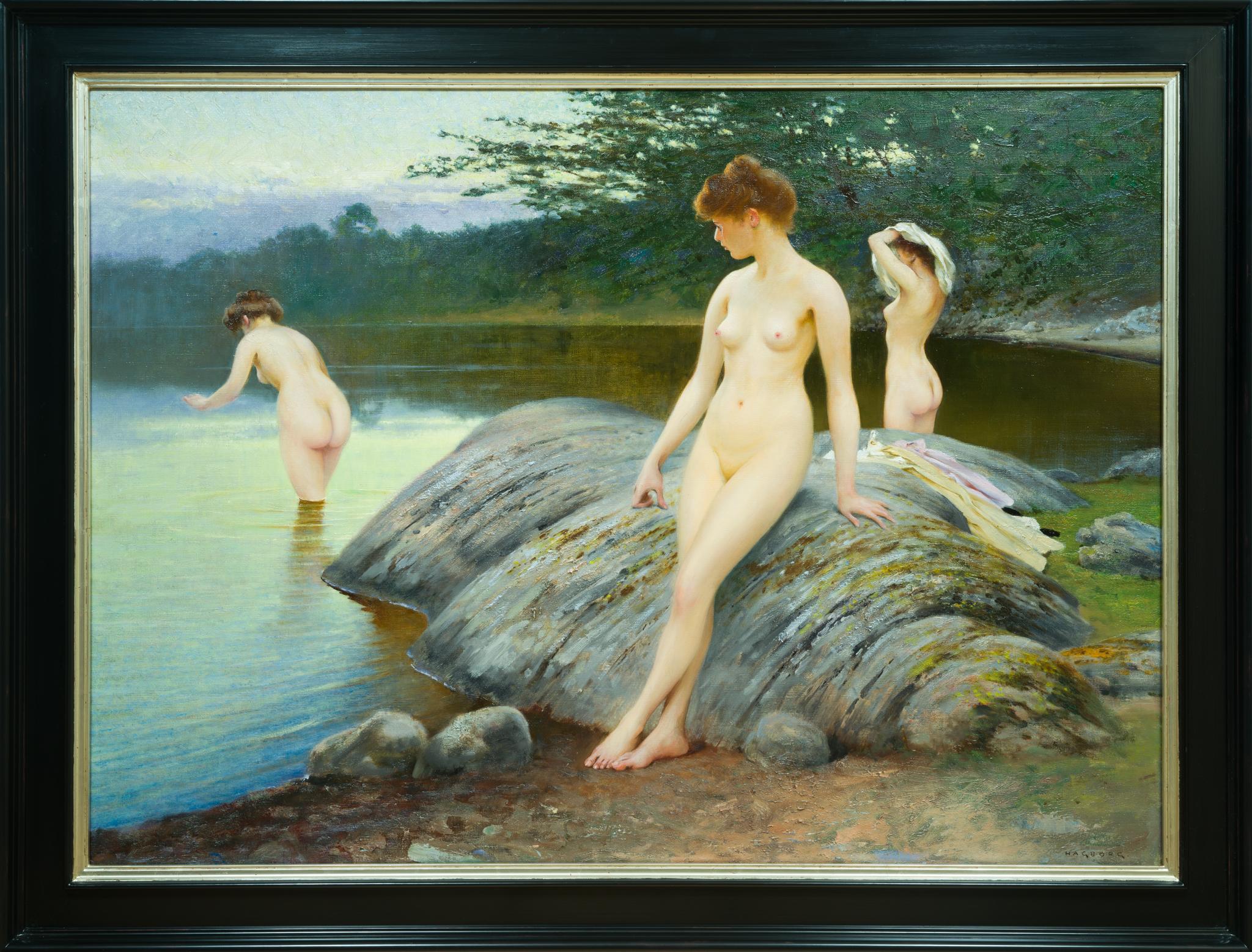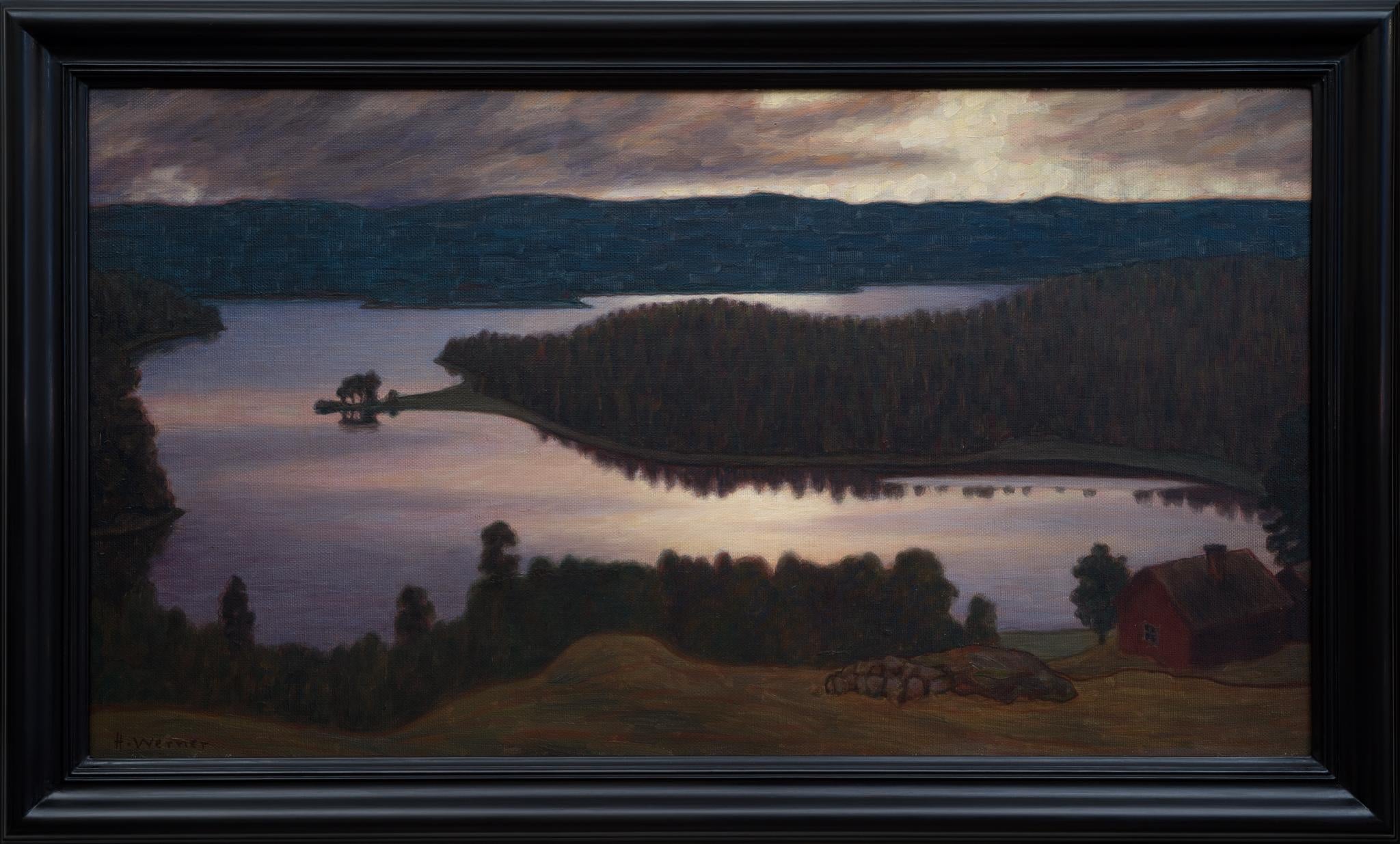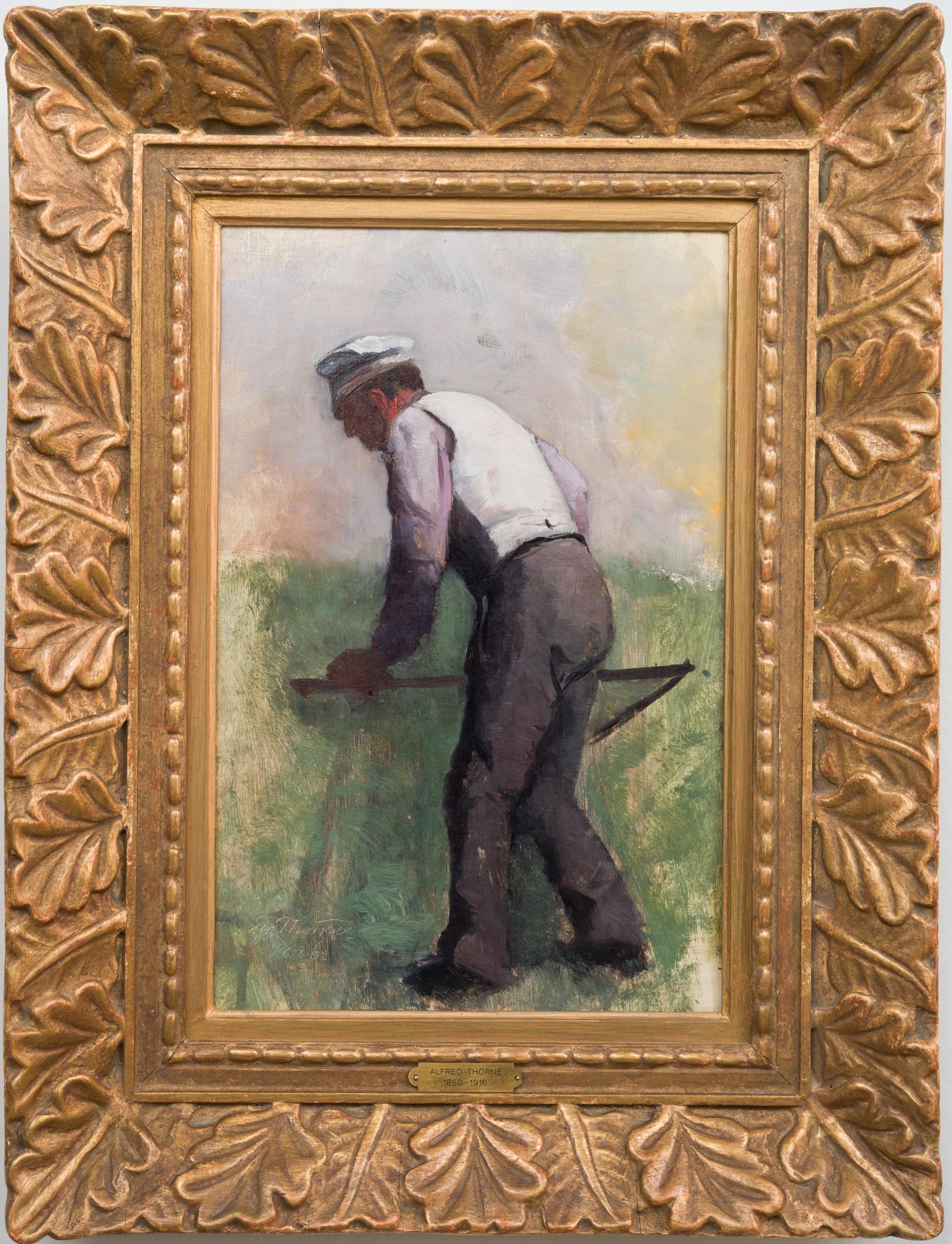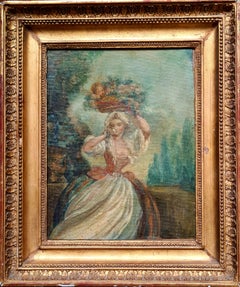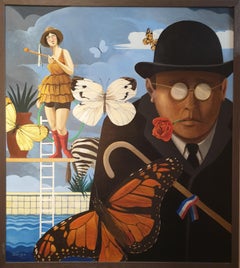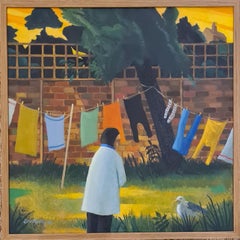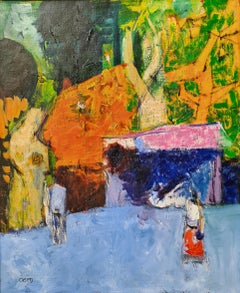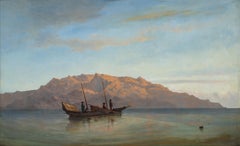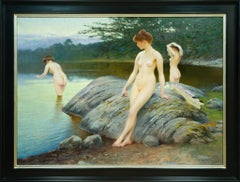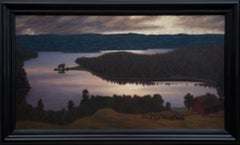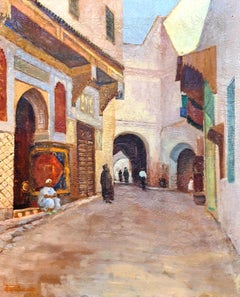
The Carpet Seller, Orientalist Street Scene.
Want more images or videos?
Request additional images or videos from the seller
1 of 14
L BourThe Carpet Seller, Orientalist Street Scene.Late 19th Century
Late 19th Century
Price:$500
$1,430.74List Price
About the Item
- Creator:L Bour
- Creation Year:Late 19th Century
- Dimensions:Height: 24.5 in (62.23 cm)Width: 20 in (50.8 cm)Depth: 0.5 in (1.27 cm)
- Medium:
- Movement & Style:
- Period:
- Condition:The painting is in good overall condition commensurate with age. There is extensive craquelure to the surface. It would perhaps benefit from a varnish.
- Gallery Location:Cotignac, FR
- Reference Number:Seller: LG/Bour1stDibs: LU1430211648262
About the Seller
5.0
Platinum Seller
Premium sellers with a 4.7+ rating and 24-hour response times
Established in 2000
1stDibs seller since 2020
245 sales on 1stDibs
Typical response time: 1 hour
Authenticity Guarantee
In the unlikely event there’s an issue with an item’s authenticity, contact us within 1 year for a full refund. DetailsMoney-Back Guarantee
If your item is not as described, is damaged in transit, or does not arrive, contact us within 7 days for a full refund. Details24-Hour Cancellation
You have a 24-hour grace period in which to reconsider your purchase, with no questions asked.Vetted Professional Sellers
Our world-class sellers must adhere to strict standards for service and quality, maintaining the integrity of our listings.Price-Match Guarantee
If you find that a seller listed the same item for a lower price elsewhere, we’ll match it.Trusted Global Delivery
Our best-in-class carrier network provides specialized shipping options worldwide, including custom delivery.More From This Seller
View AllAllegory of Love, Cupid With Beauty in Fine Dress Carrying a Basket of Flowers
Located in Cotignac, FR
A late 18th Century oil on canvas laid on board of a young beauty in period costume carrying a basket of flowers on her head. Presented in a very fine gilt, period 'Directoire' frame...
Category
Late 18th Century Romantic Figurative Paintings
Materials
Canvas, Oil, Board
Large Surrealist Scottish Oil on Canvas. 'She brought Colour into his Life'.
By Frank Docherty
Located in Cotignac, FR
Large surrealist contemporary oil on canvas by Scottish artist Frank McLean Docherty R.S.W, signed and dated bottom left and signed and titled 'She brought Colour into his Life' to the reverse.
This piece whilst wonderfully colourful, playful and erotic is typical of the witty sense of humour this artist displays in all his work. Docherty likes to tease us visually and asks questions and presents conundrums to the viewer.
Frank McLean Docherty was born in Glasgow , Scotland in 1942. He became a student at Glasgow School of Art in 1960 and graduated from the Department of Printed Textiles in 1964. He taught in a secondary school in the East End of Glasgow for two years, thereafter departing to work in Dublin in the Republic of Ireland as a textile designer (Marks & Spencer, Heals and Liberty of London). He was also an illustrator for a range of newspapers and an Art Director of magazines.
In 1973, he was appointed Principal Teacher of Art in a Scottish High School and in 1978 was honoured by the Queen when he was appointed Member of the Royal Society of Painters in Watercolours (R.S.W.) He left education in 1994. Since that time he has developed a vision which is quite unique in Scottish Art.
Bank Managers, toucans, lighthouses, penguins, bowler hats, Frank Docherty...
Category
21st Century and Contemporary Landscape Paintings
Materials
Canvas, Oil
'A Very Bad Seagull', Contemporary Oil and acrylic on Canvas.
Located in Cotignac, FR
Surrealist contemporary oil and acrylic on canvas by Scottish artist Frank McLean Docherty R.S.W, signed and dated bottom left and signed and titled 'A Ve...
Category
2010s Figurative Paintings
Materials
Canvas, Oil, Acrylic
French Village Landscape, Trees and The Square, Gassin.
Located in Cotignac, FR
An important oil on canvas village landscape, probably Gassin in the South of France, by noted Dutch painter Willem Anthonie 'Wim' Oepts. The painting carries the atelier stamp botto...
Category
Mid-20th Century Fauvist Landscape Paintings
Materials
Canvas, Oil
Price Upon Request
Mid-Century Oil on Canvas. Harbour scene. 'Farewell to the Fishermen'..
Located in Cotignac, FR
Mid 20th century oil on canvas of a crowded harbour scene, showing the local fisherman or sailors saying farewell to their families before going to sea. The painting is signed bottom right but the artist remains as yet unidentified.
A colourful yet slightly brooding and dreamlike painting. The figures are faceless and the shapes loose and undefined reminiscent of the works by Balthus who in turn was influenced by LS Lowry and his scenes of industrial districts. The colours are deep and glowing and the shapes of the figures are rounded giving a sense of warmth and evoking the quality of light seen at either dawn or dusk.
Balthasar Klossowski de Rola (February 29, 1908 – February 18, 2001), known as Balthus, was a Polish-French modern artist. He is known for his erotically charged images of pubescent girls, but also for the refined, dreamlike quality of his imagery.
Lowry is famous for painting scenes of life in the industrial districts of North West England in the mid-20th century. He developed a distinctive style of painting and is best known for his urban landscapes peopled with human figures often referred to as "matchstick men".
Category
Mid-20th Century Figurative Paintings
Materials
Canvas, Oil
Mid 20th Century Oil on Canvas View of Grenada
Located in Cotignac, FR
Mid 20th Century oil on canvas view of a street in Grenada, Spain by J Georges. The painting is signed and titled bottom right. Presented in a deep patinated and gilt wood frame.
A ...
Category
Mid-20th Century Post-Impressionist Landscape Paintings
Materials
Canvas, Oil
You May Also Like
Evening prayers by fishermen under the high coast of Celebes
Located in Amsterdam, NL
Jacob Eduard Van Heemskerck Van Beest (1828-1894)
“Avondgebed; Maleidische tripang visschers onder de hoge kust van Celebes” (Ev...
Category
19th Century Romantic Landscape Paintings
Materials
Canvas, Oil
Courtship in the Forest French Romantic School XIX century oil on canvas
Located in Barcelona, Barcelona
Title: *Courtship in the Forest*
Author: French Romantic School
Technique: Oil on canvas
Support: Canvas mounted on a stretcher
Unframed dimensions: 11.4 x 7.9 inches
Frame...
Category
Late 19th Century Romantic Figurative Paintings
Materials
Canvas, Oil
$714 Sale Price
47% Off
Three Women by the Shore, Preparing to Bathe in the Morning Light
By August Hagborg
Located in Stockholm, SE
This luminous and finely executed painting by August Hagborg captures three nude women preparing to bathe at the edge of a still, tree-lined body of water. One figure is seated on a ...
Category
Early 20th Century Romantic Figurative Paintings
Materials
Canvas, Oil
$9,600 Sale Price
20% Off
Hilding Werner (1880-1944) - Moonlight Over Krokvattnet (near Glafsfjorden)
Located in Stockholm, SE
Hilding Werner (1880-1944) was a Swedish artist known for his portraits, romantic landscape paintings of Värmland, and caricature drawings. We are privi...
Category
Early 20th Century Romantic Landscape Paintings
Materials
Canvas, Oil
"The Search" Late 19th Century Oil on Canvas by Spanish Artist M. Alonso Pérez
By Mariano Alonso Pérez
Located in Madrid, ES
MARIANO ALONSO PÉREZ
Spanish, 1857 - 1930
THE SEARCH
signed "Alonso Pérez" (lower right)
oil on canvas
23 x 12-1/8 inches (58 x 30.7 cm.)
framed: ...
Category
1980s Romantic Figurative Paintings
Materials
Canvas, Oil
"Outside The Tavern", 19th Century Oil on Canvas by Joaquín Domínguez Bécquer
By Joaquín Domínguez Bécquer
Located in Madrid, ES
JOAQUÍN DOMÍNGUEZ BÉCQUER
Spanish, 1817 - 1879
OUTSIDE THE TAVERN
signed, located & dated "Joaq. D. Becquer. Sevilla 1849." (lower right)
oil...
Category
1840s Romantic Figurative Paintings
Materials
Canvas, Oil
Recently Viewed
View AllMore Ways To Browse
Antique Bustle Dresses
Constantinople Painting
Paintings Of Egypt Pyramids
Oil Painting Steamship
Orientalist Harem Painting
Orientalist Harem Art
Oil Painting Constantinople
Constantinople Landscape Painting
Harem Carpet
Great City Traders
Rare Antique Oil Painting
1930s California
19th Century Street Scene
Dock Painting
Oil Painting Signed Peter
Sea Bird
Paintings Of New York City At Night
Sunset Water
